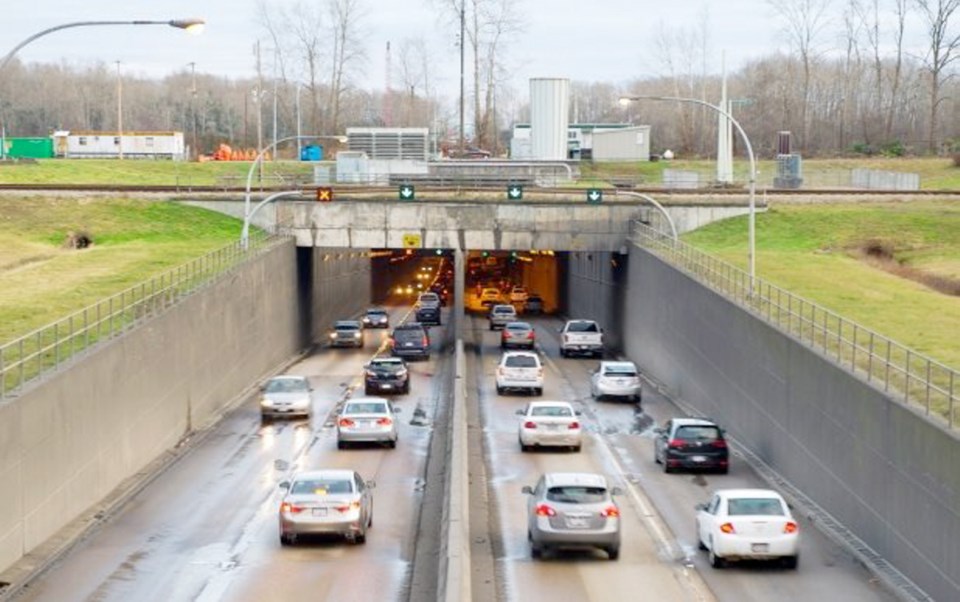 Even as she formally scrapped the Massey Tunnel replacement bridge on Monday and pushed the whole project back to square one, Transportation Minister Claire Trevena sympathized with gridlocked drivers.
Even as she formally scrapped the Massey Tunnel replacement bridge on Monday and pushed the whole project back to square one, Transportation Minister Claire Trevena sympathized with gridlocked drivers.
“We know people are sick of being stuck in traffic at the crossing and want relief now. … We are aggressively and immediately pursuing congestion relief. … I really understand people’s frustration.”
But all that empathy for drivers — including south-Island ferry users headed for Metro Vancouver — doesn’t hide the fact she has pushed any solution several years into the future.
After spending months studying an independent review of the multibillion-dollar, 10-lane bridge promised when the B.C. Liberals were in power, she formally cancelled that project, after suspending it last year.
But instead of picking an alternative, she’s starting from scratch. The ministry plans to spend two more years consulting with local governments and First Nations to align a new crossing better with regional plans and make it “more in scale with community preference.” That will take until the fall of 2020.
So the dangerously overloaded, seismically suspect 59-year-old tunnel bottleneck might not be replaced until 2030. That would be seven years past the completion date the Liberals set after overriding perpetual Lower Mainland transportation arguments and unilaterally approving it in 2013.
About $91 million was spent on prep work for the bridge before Trevena suspended it. Some of that was on engineering that might still have value, depending on what the NDP’s Plan B looks like.
Trevena also committed $40 million to fixing up the existing tunnel with new lighting, better ventilation and more frequent washing.
“It’s going to be, of course, a number of years until we are able to do a replacement, so we need to make sure that crossing is working for people.”
The independent report recommends a smaller six- to eight-lane bridge, an immersed-tube tunnel adjacent to the old one, or retrofitting the existing tunnel for use in tandem with a new crossing.
Trevena heaped all the blame for the delay on the Liberals.
“Had the options been carefully and objectively considered before the 10-lane bridge project, we would be much closer to solving the congestion.
“But they pushed ahead with a $3.5-billion mega-project without listening to communities, and we won’t make the same mistake.”
The bridge was dead from the day the NDP took power, as it was considered a pet project of Christy Clark when she was premier.
B.C. Greens were dubious about it. Another strike against it was the structure as a concession agreement, where the private contractor would operate the bridge for 25 years. The NDP criticized similar deals elsewhere in B.C. while in opposition.
Opposition Liberal MLA Ian Paton said: “Why in the world are they condemning thousands of drivers to another decade of delays and frustrations?”
A big factor wasn’t addressed Monday, but is vital. It’s the tolls. Liberals planned tolls, but the NDP removed tolls on Metro Vancouver crossings soon after taking power. So funding the project would be much more difficult.
Trevena said the technical review by independent engineer Stan Cowdell “confirmed this was the wrong project for the region” and was flawed from the start.
But Cowdell concluded it wasn’t incorrect or inappropriately developed, “only that other, less comprehensive solutions may have been selected that could also have been interpreted to meet the project’s goals.”
The cheaper options would reduce congestion, not eliminate it. Some involve construction right in the river and encroaching on agricultural and park land.
For U.S. travellers travelling the I5 “Cascadia” corridor, it’s the first foreign traffic jam once they clear the border. It will be a symbol of Canadian dithering for some time to come.



